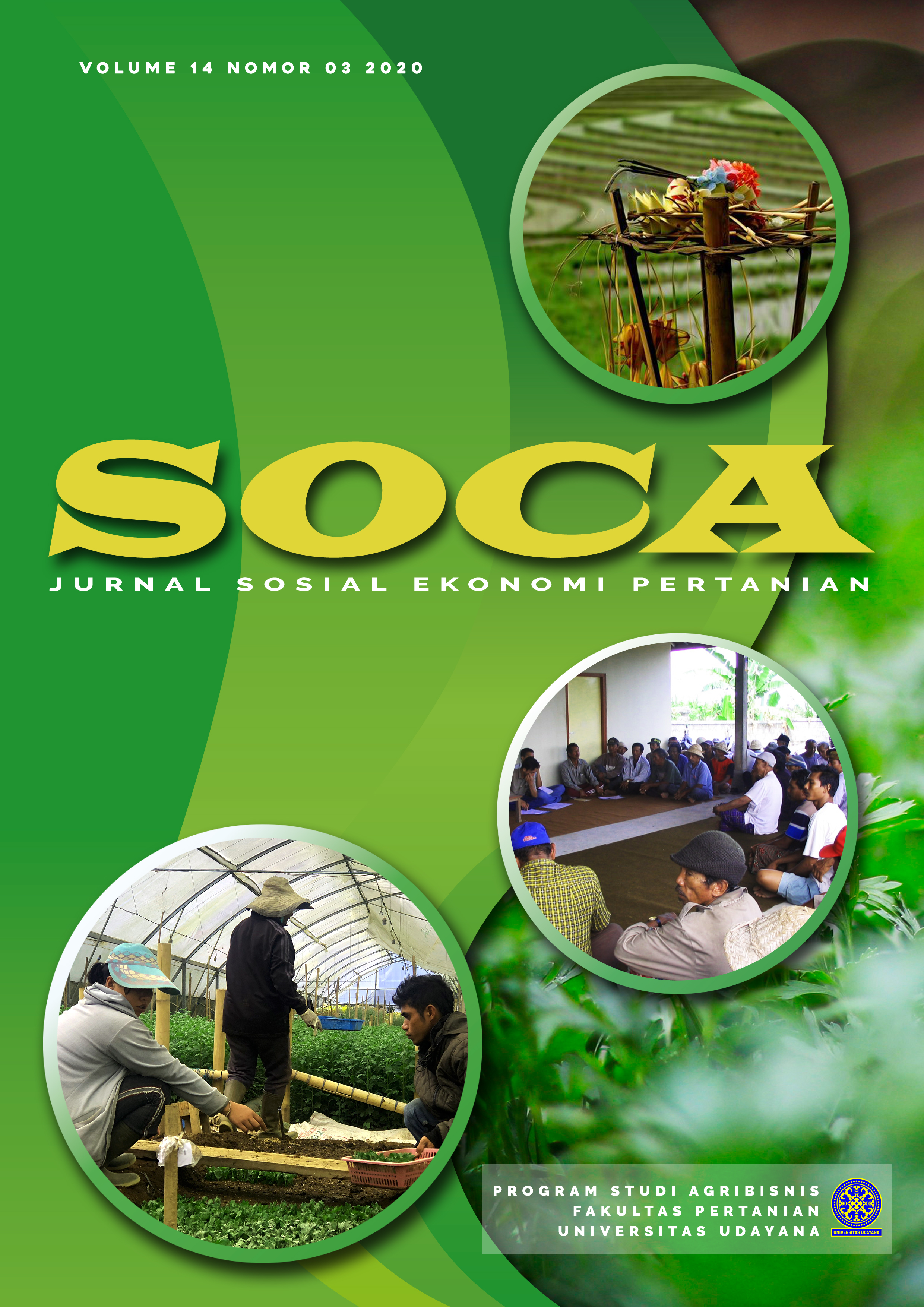The Policy of Non-Cash Food Aid Program (BPNT)
Abstract
The RASTRA Program ended in 2019 replaced by the Non-Cash Food Aid Card (BPNT). There were two important things in the BPNT program, which were free to choose the type of rice and prices that change from time to time. When the policy was not well prepared, it can trigger high prices and many speculators appeared that affected the price and stock of rice on the market. On the other hand, Bulog had prepared a change of strategy in distributing rice to the community. This certainly had a direct impact on the community or Bulog itself. So that research needs to be done with the aim to find out the benefits of the BPNT program for the community and its impact on the Bulog. The research aim was to determine the benefits of the BPNT program for the community and the impact of the program on the National Logistics Agency (Bulog). The scope of the activity was reviewing the results of studies or research related to Bulog. The data collected through deskstudy then analyzed descriptively. The government program was able to reduce the expense load of beneficiary families and provide more balanced nutrition on target, on time, increase program effectiveness and encourage financial inclusion among grassroots communities, but on the other hand during the transition period in 2019 Bulog endures losses due to the BPNT program, So we need the support from all stakeholders to solve these problems.
Downloads
References
Badan Pusat Statistik. Survei Sosial Ekonomi Nasional, Pengeluaran untuk Konsumsi Penduduk Indonesia tahun 2018. Jakarta dalam Buletin Konsumsi vol 10 no 1 2019. Pusat Data dan Sistem Informasi Pertanian. Sekretariat Jenderal Kementerian Pertanian. Jakarta
Chopra, S. and Meindl, P. 2007. Supply Chain Management: Strategy, Planning, and Operation, 3rd ed. New Jersey: Pearson Prentice Hall.
Fakhrana, R.S. 2016. Jaringan Mafia Besar di Balik Kasus Beras Oplosan. CNN Indonesia, diakses melalui https://www.cnnindonesia.com/nasional /20161014064716-12-165425/jaringanmafia-besar-dibalik-kasus-beras-oplosan?.
Firdaus, M., Baga, L.M., Pratiwi, P. 2008. Swasembada Beras Dari Masa Ke Masa, Telaah Efektifitas Kebijakan dan Perumusan Strategi Nasional. IPB Press. Bogor.
Ghozali, M.I. 2016. Rantai Pasok Beras Pada Bulog Berbasis Neural Network. Jurnal Simetris, 7 (2): 743–752.
Inpres No. 3 Tahun 2012 tentang Kebijakan Pengadaan Gabah/ Beras dan Penyaluran Beras oleh Pemerintah.
Jannah, S.M. 2018. Berantas Mafia Pangan, Buwas Pakai Jejaring TNI-Polri. Finance. Detik.com, diakses melalui https://finance.detik.com/beritaekonomi-bisnis/d-4012947/berantas-mafiapangan-buwas-pakai-jejaring-tni-polri.
Kemenko Kesra, 2014. Pedoman Umum (Pedum) RASKIN 2015.
Komisi Pemberantasan Korupsi (KPK), 2014. Laporan Tahunan KPK 2014.
Mears, Leon, 1982, Era Baru Ekonomi Perberasan Indonesia, Yogyakarta, UGM Press
Menteri Koordinator Bidang Pembangunan Manusia dan Kebudayaan, 2017. Pedoman Umum Bantuan Pangan Non-Tunai-2018. Cetakan Pertama, November 2017. Tim Pengendali Pelaksanaan Penyaluran Bantuan Sosial Secara Non Tunai. Jl. Medan Merdeka Barat No.3, Jakarta Pusat 10110.
Peraturan Presiden RI tentang Rencana Kerja Pemerintah Tahun 2015.
Pratomo HB. 2015. Lima masalah beras di Indonesia, mulai dari berkutu hingga palsu. Merdeka.com, diakses melalui https://www.merdeka.com/uang/5-masalah-beras-di-indonesia-mulaidari-berkutu-hingga-palsu.html
Sa'id Endang Gumbira. 2010. Manajemen Rantai Pasok Global Dan Antisipasi Peningkatan Kinerja Manajemen Rantai Pasok Pangan Di Perusahaan Umum BULOG. Vol 19, No 1 (2010): PANGAN. 51 -58
Sartika Ria, Emmy Darmawati, Ridwan Rachmat, 2014. Model Perkiraan Kebutuhan Pasokan Beras Untuk Program RASKIN (Studi Kasus Pada Perum Bulog Subdivisi Regional Cianjur). Jurnal, Vol 23, No 3 (2014): PANGAN. 220-231
Subandriyo, T. 2015 Mafia Pangan antara Ada dan Tiada. Koran Sindo, diakses melalui https://nasional.sindonews.com/read/1039236/18/mafia-pangan-antara-ada-dan-tiada-1441075271.
Sulistyowati, S., dan Natawidjaja, R.S. 2010. Analisis Rantai Pasok dan Rantai Nilai Beras di Jawa Barat. Jurnal Agrikultura, 21 (2): 128–136.
Trisilawaty Cory, Marimin Marimin, Noer Azam Achsani, 2011. Analisis Optimasi Rantai Pasok Beras dan Penggunaan Gudang Di Perum BULOG Divre DKI Jakarta. Jurnal Pangan. Vol 20, No 2 (2011): PANGAN : 177-197
Yun, Y. 2014. Pengendalian Persediaan Terhadap Distribusi Beras RASKIN Pada Perum Bulog Divre Jabar. Proseding Seminar Bisnis dan Teknologi, SEMBISTEK 2014 IBI Darmajaya 15–15 Desember 2014.
Vadhia Lidyana, 2019. Gara-gara Program BPNT, Bulog Ngaku Rugi Hampir Rp 1 Triliun. https://finance.detik.com/berita-ekonomi-bisnis/d-4793774/gara-gara-program-bpnt-bulog-ngaku-rugi-hampir-rp-1-triliun













